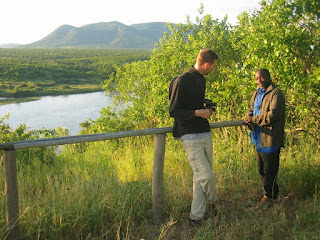

Ruaha National Park after the annual rains is an absolute Garden of Eden, a living landscape in the peak of health and beauty. Its lifeline, the Great Ruaha River, which has dried up every year since 1994 due to environmental damage caused by rice farming and cattle grazing, was flowing at full capacity when we visited this weekend.
The park is 50,000 square kilometers of natural stillness; the only sounds are wind and water, birdsong and animal call. Elephants spend hours every day rejoicing in the river, trumpeting their delight. Giraffe and zebra congregate by the hundreds along the riverbank to graze on the effusive greenery.
Guidebooks tell you not to come in the wet season because the bush is so thick that animals are difficult to see. Maybe we got lucky, but in addition to the grazers we saw thirty lion, three cheetahs and a leopard in a baobab. Of course, we wouldn’t have seen half of these animals without the incredible eyes, experience and instincts of our guide and driver, who has become a good friend since our first safari.
He routinely spots animals that are completely camouflaged, hiding in thick bush, or lying down behind baobabs - at a distance of 100 meters while sitting down and driving!
But then again, he is an extraordinary man by any measure.
After graduating from primary school at the age of 12, he spent the next ten years of his life working as a gardener and caddy on a golf course in the tea-estate highlands of Mufindi. He learned so much English from the golfers that one day his boss asked him if he wouldn’t like to take a new job as a guide in Ruaha.
This was in 1984, when the first tourist lodge in the park was being built. 24 years later, his knowledge of Ruaha is unparalleled. Having learned about local flora and fauna from his uncle as a child, he studied field guides late into the night in his first years as a guide, and so learned to recognize thousands of plant and animal species, and name them in three languages: his native Hehe, Swahili and English.
We look forward to each safari with him because we learn so much and because he radiates kindness and positive energy. Now in his mid-40s, he is happily married and has four young children who want to grow up to be park guides just like their dad. His kids love watching the DVD we made after our first safari – it was the first time they had seen their dad on the job, and they constantly rewind it to see him driving the Land Rover. One of his dreams is to bring his whole family to Ruaha.
We’ll be offline for the next couple of weeks as we travel to the coast and then up north for our first look at Serengeti and Ngorongoro. World famous though they are, we’ve heard about the hordes of tourists and vehicles, and wonder how anything could possibly beat being alone with our friend in the sanctity of Ruaha.



